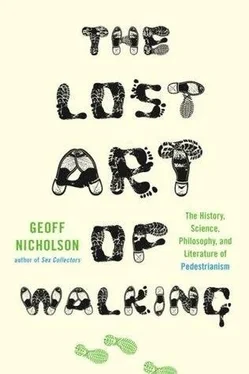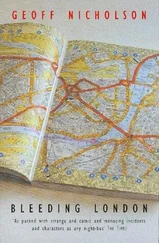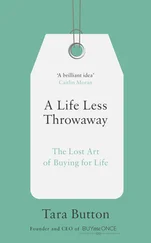A better precedent, I discovered, was Thomas Jefferson, a mad keen walker by all accounts but also an unfortunate one. In Paris, in 1785, he, too, fell over while walking and broke his right wrist. There are various accounts of the circumstances: that he fell while jumping over a wall, in the company of an unnamed friend, though sometimes the unnamed friend is an unnamed married woman and sometimes the wall becomes a kettle. These are all, it seems to me, variations on the same story — though another variant has the broken wrist caused by a fall off a horse, which definitely spoils things.
What seems certain is that Jefferson didn’t get very good treatment from the doctors of Paris. His arm was completely out of action for several weeks and gave him trouble for the rest of his life. Much later, in 1821, just a few years before his death, he fell again, on a broken step while descending a staircase, and this time broke the left arm.
And then there is Jean-Jacques Rousseau, he of The Reveries of the Solitary Walker . On the second walk, he’s on the road ‘down from Menilmontant almost opposite the Galant Jardiniere’, having spent an afternoon in ‘peaceful meditations’, when he sees a Great Dane barreling toward him, running ahead of a carriage, which apparently was the style in those days. Rousseau decides that in order to avoid being knocked down he’ll make a ‘great leap…so well timed that the dog would pass under me while I was still in the air’.
History doesn’t tell us how big the Great Dane was, but it couldn’t have been very small if Rousseau thought it was going to knock him down, so say it was three feet tall — I don’t know how much of an athlete Rousseau was, but if he was really thinking about jumping three feet straight up in the air from a standing start, he must have had a high regard for his own prowess. His abilities weren’t put to the test. While he was doing his calculations about when and how to jump, the dog hit him and knocked him over and out. ‘I did not feel the blow, nor the fall, nor anything of what followed until the moment I came to’, he wrote.
He was so stunned that he suffered from momentary amnesia, didn’t know where he was, and couldn’t even tell the people who picked him up where he lived. But eventually he remembered. Someone advised him to get a cab home, but he didn’t, he walked , ‘easily and sprightly, feeling neither pain nor hurt, though I kept spitting out a lot of blood’. And eventually he got home. ‘My wife’s cries on seeing me made me understand I was worse off than I thought’.
Fortunately, he wasn’t as badly off as some people thought. The Courier d’Avignon on December 20, 1776, mistakenly reported that he was dead:
‘M. Jean-Jacques Rousseau has died from the after-effects of his fall. He lived in poverty — he died in misery; and the strangeness of his fate accompanied him all the way to the tomb.’
Dying while out walking: it doesn’t get much stranger than that. It’s certainly much stranger and more epic than breaking an arm. And in some ways I found myself wishing that my own injuries had been stranger, or at least more dramatic. Nobody is impressed by or even very sympathetic toward a broken arm. Nobody, and I include myself in that category, understands how it might send you into a tailspin of melancholy. As I recuperated physically, I found myself becoming increasingly, and it seemed to me unjustifiably, gloomy and depressed. The intensity of the feelings seemed out of all proportion to the injury. OK, so I’d broken my arm — OK, so I couldn’t walk as much as I wanted to in fact, I was scarcely walking at all. But why would that plunge me into the kind of despair I was feeling? It seemed unfathomable.
And then I read Oliver Sacks’s book A Leg to Stand On . It describes how he broke his leg while walking, and the long, surprisingly traumatic process of his recovery. The story of his break offered all the surface drama and excitement that my own lacked. He did it while walking on a mountain in Norway, and he fell while being chased by a bull. The injury was serious. He was alone on the mountain and it took him six hours to drag himself to anything like safety. He might easily have died.
Sacks’s break was complicated, the convalescence infinitely more painful and protracted than mine. His triggered a personal and professional crisis, and although my own injury wasn’t quite doing that, not yet anyway, I feared that it might, and I saw all too clearly how an injury that the world regarded as trivial, as little more than a simple repair job, could completely change your view of the world and yourself.
Sacks’s case was complicated because he was a doctor who suddenly became a patient, a change of role and status that I imagine all members of the medical profession would find threatening. But he also experienced an anguish far more general, yet from where I was now standing (or slumping) far more recognizable than that. He writes:
‘Almost every patient who had had injury or surgery to a limb, and whose limb had been casted, out of sight, out of action, had experienced at least some degree of alienation: I heard of hands and feet which felt ‘queer’, ‘wrong’, ‘strange’, ‘unreal’, ‘uncanny’, ‘detached’, and ‘cut off’’.…Yes, that seemed to be describing my own condition, but I’d have said it was more than that. I didn’t just feel detached from my injured arm — I felt detached from the whole world.
As I sat around the house in L.A. nursing my broken arm, and doing no walking, I became increasingly dispirited. I was feeling depressed, and although there were some reasons for that, those reasons didn’t seem great or serious enough to justify the scale of my feelings. I felt feeble, vulnerable, becalmed, utterly miserable. I was spending my time reading books about walking, but I thought I might never walk out of the house again. I considered myself a good and enthusiastic walker, a fully qualified pedestrian. I loved walking: it was a source of happiness, wonder, and enlightenment. Yet a walk to the end of the street now seemed as impossible as a journey of a thousand miles. I told myself I wasn’t doing any walking because I was so depressed and enervated. And then I thought of something. Perhaps I was depressed and enervated precisely because I wasn’t doing any walking.
I should have realized this much sooner. There was something very familiar about it. It was something I had worked out some time ago, then managed to forget. The truth is, the real reason I walk is because I have to. I walk because it keeps me sane. I had proved this to myself a couple of years back when I first arrived in Los Angeles.
Walking Wounded with Ray and Phil and Others
I took the steps down Angel’s Flight to Hill Street: a hundred and forty steps, with tight fists, frightened of no man, but scared of the Third Street Tunnel, scared to walk through it — claustrophobia. Scared of high places too, and of blood, and of earthquakes; otherwise, quite fearless, excepting death, except the fear I’ll scream in a crowd, except the fear of appendicitis, except the fear of heart trouble.
— JOHN FANTE, Ask the Dust
John Paul Jones, the bass player of Led Zeppelin, has a story that he still trots out in interviews, of how he was arrested in the 1970 sfor leaving his hotel room and daring to walk the streets of Los Angeles. ‘I didn’t realize you’re not supposed to walk anywhere’, he says.
D.J. Waldie, author of Holy Land , writes about the one-mile daily walk from his home to his office (actually in Lakewood, in Los Angeles County, rather than the city). He describes being ‘stopped by a sheriff’s patrol car on a completely empty stretch of suburban sidewalk, at midday, dressed in a coat and tie, and ordered to identify myself and explain my destination. As a pedestrian, I was a suspect’.
Читать дальше












